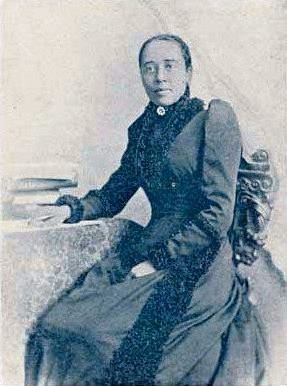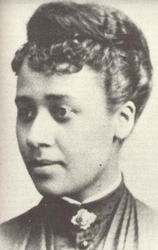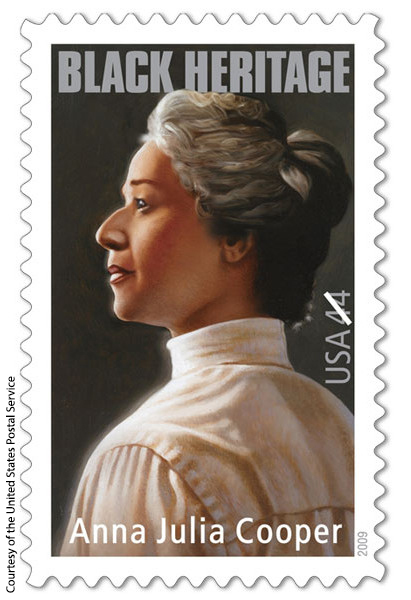Leadership Gallery
Anna Julia Haywood Cooper, 1858-1964
The colored woman feels that woman's cause is one and universal; and that not till the image of God, whether in parian or ebony, is sacred and inviolable; not till race, color, sex, and condition are seen as the accidents, and not the substance of life; not till the universal title of humanity to life, liberty, and the pursuit of happiness is conceded to be inalienable to all; not till then is woman's lesson taught and woman's cause won--not the white woman's, nor the black woman's, nor the red woman's, but the cause of every man and of every woman who has writhed silently under a mighty wrong.
- Anna Julia Haywood Cooper
From A Voice from the South, Cooper's 1892 book. Print courtesy of UNC and "Documenting the American South" project.
Anna Julia Haywood Cooper, Episcopal educator and author, was born on August 10, 1858, in Raleigh, North Carolina. Her mother, Hannah Stanley Haywood, was enslaved. As her mother refused to discuss the matter, Anna's paternity was never fully determined, but she believed her father to have been her mother's owner, Dr. Fabius J. Haywood, Sr., or his brother George.
Anna began what would be an unusually distinguished academic career at the age of nine, when she enrolled in the newly established St. Augustine's Normal and Collegiate Institute. It was at St. Augustine's that she first embraced the Episcopal faith. By the time she was 11 years old, her math and language abilities had earned her the position of "scholarship-teacher," which paid a stipend of $100 a year in exchange for tutoring other students. Cooper spent 14 years at St. Augustine's, staying on as a matron after she graduated. She remembered her time there fondly, in spite of the institutional prejudice against women she experienced. At a time when Greek classes were only open to male students of theology, she expressed her desire to participate and was at first excluded. Cooper protested this exclusionary practice to the administration and eventually became the first woman at the school allowed to study Greek.
In 1877 while still working at St. Augustine's, she married George Cooper, a minister and professor of Greek from Nassau, British West Indies. George died two years later, leaving Anna a widow at the age of 21. She never remarried, but instead devoted her life to academics, education and the pursuit of social justice. In 1881 she left St. Augustine's and moved north to Ohio, where she attended Oberlin College, one of the first American colleges to admit both African American and white students. Because of her impressive array of academic achievements at St. Augustine's, she was admitted as a sophomore. At the time Oberlin offered two courses of study – a traditionally rigorous course for "gentlemen," and a two year course designed to provide "ladies" with a basic but inferior college education. Cooper opted to pursue the Gentleman's course, and earned her Bachelor of Arts in 1884. She was awarded an honorary Master of Arts by Oberlin in 1887.
Immediately following the receipt of her master's degree, Cooper accepted the post of math and science teacher at Washington High School in Washington, D.C., a prestigious preparatory school for Black students. Washington High School was later known as the M Street School, and finally as the Dunbar School. Cooper was to spend the majority of her career at Dunbar, beginning her employment in 1887. In 1902 she was appointed principal of the school. Cooper's philosophy on education for African Americans differed significantly from that of other leading Black educators, notably Booker T. Washington, who was friendly with Cooper's predecessor as principal, with the superintendent of the district, and with the man who replaced her in her position. Washington held that the best way to advance the race lay in a focus on vocational education, while Cooper felt strongly that all students, regardless of race or gender, deserved the opportunity to receive a solid college education. To that end, she spent her time as principal of M Street enhancing the vocational programs with the addition of a strong college preparatory program, actively seeking college placement and scholarships for her students. The program was extremely successful, with students accepted into Harvard, Yale and Brown, but in spite of this Cooper was asked to discontinue her non-vocational approach and to adopt inferior textbooks for her students. When she refused, she was forced to resign as principal.
After her dismissal, she took a job teaching language at the Lincoln Institute in Jefferson, Missouri, where she stayed for four years. During that time, she fought her dismissal from M Street, and finally, in 1910, she was recalled to the M Street School, but was not offered the position of principal. Instead, she was reinstated in the significantly less prestigious position of Latin teacher. She was to spend the next twenty years in that position. While teaching Latin at M Street, Cooper continued to further her education. She spent the summers of 1911 to 1913 in France, at the Guilde Internationale de Paris, where she studied French history, literature and linguistics.
Anna Julia Cooper is the 32nd person commemorated on a postage stamp in the U.S. Postal Services Black Heritage Series, June, 2009. Image courtesy of the United States Postal Service.
The next few years were some of the busiest of her life. Columbia University in New York accepted her as a doctoral candidate in 1914. In 1915, at the age of 57, she adopted her nephew’s five orphaned children, who ranged in age from six months to twelve years old, and expended a great deal of effort moving into a larger house to "contain their Southern exuberance." On evenings and weekends, she completed the course work for her doctorate degree. However, to grant the degree, Columbia required a year's residency, which Cooper was unable to fulfill because of her other responsibilities. She transferred to the Sorbonne, where she was granted her doctorate at the age of 65.
When she retired from M Street School in 1930 at the age of 72, she became president of Frelinghuysen University, an institution offering education for older, employed African Americans. Founded in 1906 as a way for African Americans to improve their lives and expand their opportunities, Frelinghuysen offered both vocational and academic training. Cooper was a strong supporter of the Frelinghuysen ideal of self-help; the school was an entirely self-supported African-American enterprise. Cooper herself offered her home as a classroom when the University needed a permanent location, and after her presidency, she stayed for a further ten years as the registrar.
Her life was distinguished by her vocation as an educator and a political, social and community activist. Throughout her life she was concerned with the welfare of women and African Americans, and devoted her energies to writing and speaking extensively on her belief in empowerment through education. She participated in conferences on racial and gender equality and education, including the World's Congress of Representative Women at the Chicago World's Fair in 1893, the Woman Suffrage Congress in 1893, and the Pan-African Conference in London in 1900. She was also the first woman to become a member of the American Negro Academy, an intellectual organization founded by the Rev. Alexander Crummell, an Episcopal priest, to further higher education and racial equality.
Cooper's publications include her Columbia doctoral thesis, a translation into modern French of Le Pelerinage de Charlemagne, an eleventh century French epic, which was used as a college text; her thesis from the Sorbonne, a work examining the racial attitudes of the French revolutionaries towards their Caribbean colonies; and several compilations of essays and speeches, among which the most widely known work is A Voice from the South, by a Black Woman from the South, published in 1892. A Voice from the South puts forward Cooper's philosophy that the social and educational uplifting of African-American women would necessarily result in the elevation of the race in general, and that the uplifting of the African- American race would itself improve the rest of society.
Anna Julia Cooper died in her sleep on Feb. 27, 1964 at the age of 105, and was buried next to her husband George. [Sources]




